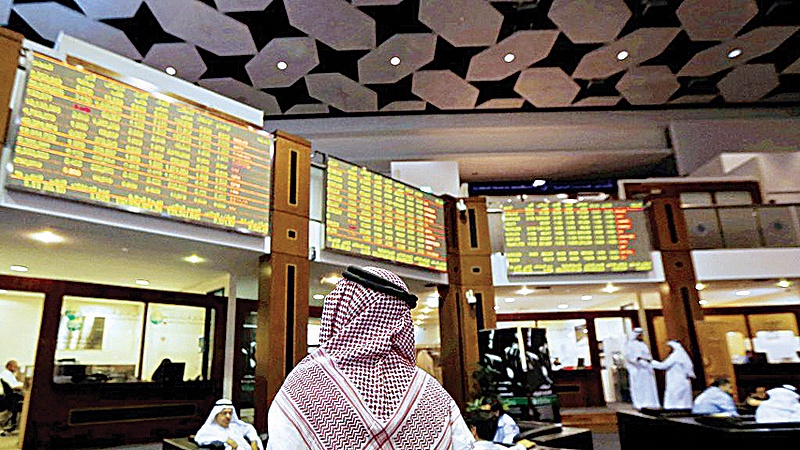KUWAIT: Kuwait Finance and Investment Company (KFIC) released its report for Q3 2019 which discusses the status of local and international markets.
GCC economic news
Kuwait's non-oil economic growth in 2020 is expected to reach +3.5 percent, according to report from IMF. Kuwait is trying to diversify its economy away from oil as it contributes to 90 percent of its GDP, especially with geopolitical tensions, OPEC oil cuts, and unsteady oil prices. Moreover, to boost economic growth outside the oil sector, Kuwait is investing heavily in its Northern Gulf Gateway (NGG) project which is predicted to attract up to $450 billion in foreign investment. The country's recent upgrade from frontier to emerging market by MSCI was an acknowledgment of Kuwait's reforms, direction, and vision. Saudi Arabia's economic growth will be less than forecasted in 2019 due to oil cuts led by OPEC and geopolitical tensions. The Kingdom's GDP is projected to increase by 1.9 percent, less than 2018's growth of 2.2 percent, according to the International Monetary Fund (IMF). However, non-oil GDP is expected to accelerate to +2.9 percent in 2019 due to Saudi Arabia's efforts in diversifying its economy away from oil by implementing its reform program that aimed at supporting the diversification of the economy, inclusive growth, and job creation. In the UAE, the government will increase its federal budget by 2 percent in 2020 from 2019's budget, the country's largest budget with zero deficit. The increase will bring the Federal budget to AED 61.55bn from AED 60.3bn, the country's highest budget on record. The new budget will aim to support community development programs, upgrading the educational system, and develop the healthcare sector. In Qatar, the tourism sector witnessed +11 percent increase in the first 8 months of 2019, similar to the same period a year ago, according to Qatar National Tourism Council (QNTC). The tourism sector is undergoing rapid development, with milestone achievements in the sub sectors of cruise, business events and sports. Oman's GDP fell -1.6 percent year-on-year during the first quarter of 2019 to USD 18.4bn, according to the National Centre for Statistics and Information (NCSI). The Sultanate's oil GDP also fell by -0.5 percent year-on-year $6.28 billion due to lower oil prices. In Bahrain, the government sold $2 billion worth of international sukuk along with conventional bonds. The sukuk have a term tenor of 2027 with a yield of 4.5 percent, while traditional bonds are due in 2031 with a yield of 5.625 percent.
GCC equities review
GCC equities as measured by the MSCI GCC IMI index fell by -5.57 percent QTD, Saudi's Tadawul all share index was the worst performer during the quarter followed by Kuwait's all share index, while Dubai's DFM index was the best performer in the region. Saudi Arabia's Tadawul All Share index decreased by -8.27 percent where the worst performing sectors were Media -14.34 percent, Banks -13.35 percent, and Materials -10.07 percent. Kuwait's All Share index slipped by -2.61 percent with weak performances coming from Technology -16.96 percent and Basic Material -11.96 percent. Qatar's QE index dropped -1.44 percent mainly from a drop in Insurance -4.22 percent, followed by Industrials -3.97 percent, and Real Estate -3.87 percent. In the UAE, Dubai's DFM index gained +4.61 percent with positive contribution coming from Insurance +13.57 percent and Telecom +8.93 percent. In Abu Dhabi, the ADSM index increased by +1.55 percent mainly coming from Consumer Staples +100.13 percent followed by Real Estate 10.16 percent. In Oman, MSM 30 index added +3.42 percent mainly led by an increase in Banks +4.36 percent. In Bahrain, BSE index rose +3.09 percent with a strong performance from Banks +4.65 percent. International Economic
Overview:
Global equity markets were mainly flat during the third quarter as indicated by the MSCI World index which gained +0.08 percent quarter to date (QTD). In developed markets, the highest performance came from the CAC 40 Index and Nikkei 225. In the United States, the S&P 500 rose +1.19 percent QTD despite further disruption in the US-China trade war saga which has led to global trade contracting in the first seven month of the year.
However, the market received some relief from the Federal Reserve as it cut interest rates for the second time this year by 25 basis points. In Europe, France's CAC 40 index was the best performer increasing by +2.51 percent QTD, as the government introduced easing monetary policies by cutting taxes and lowering its interest rate which supported the index gains during the second quarter. In the UK, FTSE 100 fell by -0.23 percent QTD as political tensions increased between the government and Prime Minister Boris Johnson over the Brexit memorandum.
The UK is yet decide on whether to leave the EU by October 31st via a hard or soft Brexit, and the parliament could request for another timeline extension. In Japan, the Nikkei 225 was the second best performer, adding +2.26 percent QTD which was supported by blue-chip companies' gains during the quarter. In China, the Shanghai Composite slipped by -2.47 percent QTD as China's manufacturing sector shrank for a fifth month in September, amid the effects of the ongoing China-US trade war. The trade conflicts between China and the US had a notable impact on exports, production costs and confidence of enterprises as the United States introduced new tariffs and also increased current tariffs on Chinese imports. In commodities, WTI fell by -7.13 percent QTD to close at $54.1 bb/l and Brent dropped -7.13 percent to close at $59.3 bb/l. Crude prices were weighed down by geopolitical tensions, the on-going trade war between the United States and China, and a slowing global economy.
- Sources: KFIC Research, Reuters, Bloomberg, CNBC, KUNA, IMF, BTEA, EFG
KFIC Report on GCC, global markets











